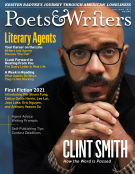Something magical happens when a poet turns their attention to prose. Sentences take on the lyric quality of the line, and paragraphs assume the compact perfection of stanzas. Multiple truths are given equal weight, and every single word is intentional.

Clint Smith (Credit: Barry Harley Photography)
Such is the case with Clint Smith’s second book, How the Word Is Passed: A Reckoning With the History of Slavery Across America, an ambitious volume published in June by Little, Brown about the ways America remembers its history of slavery. Each chapter is devoted to a location or landmark, and while some cover familiar sites like Thomas Jefferson’s Monticello, others feature lesser-known places, like Blandford Church and Cemetery, which houses one of the largest mass interments of Confederate soldiers in the U.S. South. Stories about Smith’s travels and his conversations with employees and visitors slip seamlessly into history and historiography—all of which are knit together with the beauty of his magnetic prose.
“You’ll probably hear my children in the background,” says Smith, who lives in Maryland with his wife and two kids, as we sit down for a Zoom interview near the end of March. My first question is about his new book’s inception, and I quickly learn that it began in another genre. Smith discovered his love of writing in 2008 during a visit to the Nuyorican Poets Cafe, a haven for Black and Brown poets located on Manhattan’s Lower East Side. Back then he was a self-described “disillusioned English major struggling to connect with the canon,” but after one night at the Nuyorican, Smith was hooked. He would go on to an illustrious career as a poet, winning the Jerome J. Shestack Prize from the American Poetry Review in 2017 and the National Poetry Slam championship in 2014 with the Beltway Poetry Slam team. He would also publish Counting Descent (Write Bloody Publishing, 2016), a prize-winning collection exploring themes of race, genealogy, and coming-of-age.
Less than a year later, after Smith’s hometown, New Orleans, removed a statue of Robert E. Lee in the spring of 2017, Smith began planning a second collection in which each poem would discuss a Confederate monument in the city. “At first it was just one poem, because poetry is how I entered my life as a writer,” he says. Smith envisioned a book that grappled with the question, What did it mean to grow up in a place in which there were more homages to enslavers than to enslaved people? The idea most certainly could have worked, but soon he felt he needed more space, so he decided to try his hand with an essay, penning “An Intimate History of America”—about visiting the National Museum of African American History and Culture with his parents and grandparents—for the Paris Review Daily in late 2017. In an instant a would-be poetry book turned to prose, and the rest is—quite literally—history.
Over time the project’s geographical scope changed to include other U.S. cities and Gorée Island, a major slave-trading post off the coast of modern-day Senegal. Still, the book’s concept wasn’t fully realized until Smith visited Monticello in 2018, shortly after learning about a newly added Sally Hemings tour. On the day of his planned visit, the Hemings slots were full, so he opted for a tour that dealt specifically with Jefferson’s relationship with slavery. Afterward he approached fellow visitors to hear their thoughts. His aha moment came during a conversation with Donna and Grace, two white women whose reactions to learning the truth about Jefferson are included in the Monticello chapter. “Reporting isn’t a natural thing for me,” says Smith, who recently became a staff writer at the Atlantic but is still surprised when people call him a journalist. “Walking up to strangers and asking them questions runs counter to my ethos, but I did it when I was at Monticello. And I was like, Oh, okay. This is what this book needs to be.” As the women talked, Smith realized he wanted How the Word Is Passed to contain more than self-meditation and personal reflection. “It had to be about the multiplicity of voices…how we all converge in these places and experience them in different ways depending on who we are.”
![]()
During our interview I got to witness firsthand the attentive nature with which Smith approaches difficult conversations about slavery, racism, and systemic carceral violence. But don’t be fooled: Though he maintains a down-to-earth air, Smith holds an impressive résumé and has enjoyed a wildly successful writing career, one that has seen viral TED Talks, a formidable social media following (even his most casual tweets, like a recent one about air fryers, garner thousands of likes), and a doctorate in education from Harvard University. A simple Google search speaks to the breadth and depth of his accolades: links to old poetry slam videos are listed alongside New Yorker essays about racism in soccer, a sport he played from childhood to his undergraduate days at Davidson College. And his awards are just as prestigious as his publications. Counting Descent won the 2017 poetry award from the Black Caucus of the American Library Association, was a finalist for an NAACP Image Award, and in 2017 was chosen as the One Book One New Orleans citywide read. [Smith is also a contributing editor of this magazine.]
Yet, in the midst of all this, his deep commitment to education remains. Over the past decade, he has taught in high schools, jails, and prisons and currently teaches writing and literature in the D.C. Central Detention Facility. Smith is an ambidextrous scholar; his intellectual influences range from the work of noted historian Walter Johnson to the 2011 execution of Troy Davis, whose conviction for the 1989 murder of a police officer was based on dubious witness testimony and shoddy evidence. Indeed, Clint Smith wears many hats—poet, incarceration scholar, educator, father—all of which come to bear on the extensive research, incisive social critiques, and careful consideration of multiple perspectives that compose How the Word Is Passed.
![]()
Perhaps the hallmark of Smith’s capacity for inclusivity—not to mention journalistic objectivity—lies in the new book’s fourth chapter, which chronicles his trip to Blandford Cemetery’s Memorial Day celebration, hosted by the Sons of Confederate Veterans (SCV). The event included a color guard led by men in battle regalia, an acoustic rendition of the Confederacy’s de facto national anthem “Dixie,” and a speech by Paul C. Gramling Jr., SCV’s commander in chief at the time. Accompanied by a white friend, Smith stood apart from the attendants, but once the ceremony was over, he approached several individuals for interviews. When I confessed that I would have been unable to do a similar thing, Smith spoke candidly about his discomfort but explained the importance of hearing the attendees speak. “It was really helpful to see what the contemporary manifestation of the ‘Lost Cause’ looks like and to really understand that lineage and loyalty take precedence over evidence,” he says. “I couldn’t let my own issues with every inaccuracy they may have propagated get in the way of them telling me how they felt.”
Still, How the Word Is Passed pulls no punches when dismantling the specious rhetoric of Confederate sympathizers. When Gramling, during his speech, attributes Memorial Day’s inception to a group of white Mississippi women in 1866, Smith follows up by tracing the holiday’s history to newly freed Black South Carolinians commemorating Union soldiers one year before. When an attendee mentions Richard Poplar, a Black man he claims willingly fought for the Confederacy, Smith produces historical evidence suggesting that Poplar was more likely a cook for the soldiers, since the Confederate Army prohibited Black men from enlisting for essentially the entire war.
Earlier in the same chapter there was a similar moment I was eager to discuss with Smith. It was a conversation he had with a visitor center employee after visiting a site across from the cemetery: Blandford Church, its commissioned Tiffany glass windows their own monument to the Confederate States of America. It was Smith’s visit to the church that would lead him to attend the Memorial Day event. When he discovers a flyer for it on a counter at the visitor center, the employee apologizes profusely, insisting she was bothered by the Sons of Confederate Veterans, who, according to her, take Southern pride too far. “I don’t think that Robert E. Lee would have been pleased with all this deitizing. He was a very humble person,” she insists. But again, Smith quickly parses fantasy from fact, writing that, while it was true Lee was hesitant to erect postwar memorials, it was not because he imagined an egalitarian society. Lee was a brutal enslaver who separated families and made examples of individuals who escaped. Smith includes the account of one such person, who describes how he was captured, beaten, and, in an act of excessive depravity, had his wounds doused with brine.
During our conversation I describe how, while reading the passage, I found myself refusing to think about the beating for fear that, if I focused on it too intently, I might enter a dangerous emotional space. I asked Smith if, during any of his trips, there were moments when he felt similarly. He points immediately to two places he discusses in detail in the book: the Field of Angels and Angola prison.
As Smith writes, the Field of Angels is particularly haunting. Located approximately fifty miles west of New Orleans on the Whitney Plantation, the Field of Angels is a courtyard filled with granite plaques listing the names of dead enslaved children. In its center sits the statue of an angel cradling one of the deceased. In the book, Smith says that, at the time of his visit, he was the father of a toddler, with another child on the way, which made standing in the Field of Angels undeniably emotional. He elaborates on the experience during our interview, explaining how, as a tour guide discussed rates of infanticide, he quickly became overwhelmed. “This is something we’ve heard from folks like Toni Morrison, and you hear it in the historiography…[but] that that would even cross someone’s mind is so—I don’t even have words for it,” he sighs. “I tried to lean into it emotionally as a writer, even if in the moment I was experiencing an emotional paralysis.”
Smith’s visit to Louisiana State Penitentiary—also known as Angola—is another experience that still haunts him. Though How the Word Is Passed recounts Smith’s trip to the facility in harrowing detail, the statistical evidence it provides tells its own story. Angola is the largest maximum-security prison in the country. Seventy-one percent of its inmates are serving life sentences, and 75 percent of them are Black. At the time of Smith’s visit there were sixty-nine people on death row, and incarcerated workers in Angola’s massive fields earned seven cents an hour. Still, Smith says the execution chamber was the most frightening space, and during our conversation, he explains why: “Physically being in that room and experiencing the stillness, and just reflecting on the fact that we do this on purpose, and very, very intentionally…is something that will remain with me for the rest of my life.”
When I tell him that reading about Angola made me, a fellow Louisianan, feel ashamed, Smith is careful to point out that the blame is not regionally specific. He notes that the prison, which was nicknamed after the plantation on which it now stands and the people who were enslaved there, is more than a local problem. It is an American problem. Experts’ comparisons of Louisiana’s incarcerated population to those of authoritarian regimes like China and Iran single out the state in ways that make it seem like a carceral anomaly instead of a national norm. And according to Smith, that is not the full story. “What are the specific manifestations of white supremacy and anti-Blackness in the U.S. that allow this plantation to be turned into a prison?” he asks me. “What are the failures of our collective memory and understanding of enslavement that have allowed the afterlife of slavery to be so present in the landscape of that space?”
![]()
These are questions How the Word Is Passed answers with tact and clarity—in the chapters mentioned as well as in others, like the one about Gorée Island, where captured Africans embarked on the Middle Passage, and New York City, where Smith reveals how banking companies, like what is now known as JPMorgan Chase, accepted enslaved people as collateral and seized them when plantation owners defaulted on loans. The book ends with an account of Smith’s own family history with slavery and Jim Crow segregation and his coming to understand the ways the two institutions have shaped both his personal and ancestral histories.
Smith is, in fact, always aware of his subjectivity as both the descendant of working-class Black Southerners and a Harvard-educated PhD. But these multiple identities are also highly mutualistic. He says that his dissertation, which explores the relationship between education and incarceration, was heavily influenced by growing up in a city with the reputation as the murder capital of the United States. “That language was so central to my childhood,” he tells me. “Thinking about criminality and incarceration very much shaped the scholarly decisions that I made. [It was] the white noise of my coming-of-age.”
Each chapter of How the Word Is Passed illustrates how, for better or worse, institutions shape how we see ourselves individually and collectively, how we think about the world around us, and how we remember the past. It also calls for a national reckoning with the amnesia that makes places like the ones discussed in the book so vitally important—and, in the case of sites like Blandford Church and Cemetery, deeply problematic.
As our conversation drew to a close, we returned to the institution of slavery, whose importance remains the focus of the book from the first page to the last. Perhaps one of the most eloquent passages in How the Word Is Passed is about Frederick Douglass and how his exceptionalism might create a skewed sense of how difficult it was to escape bondage. “No one, enslaved or otherwise, was like Douglass,” writes Smith. “There were other brilliant, exceptional people who lived under slavery, and many resisted the institution in innumerable ways…. [Their] stories might be less sensational but are no less worthy of being told.” During our call we laugh about the sheer scope of Douglass’s genius; there was scarcely a contemporary about whom Douglass did not write, sometimes with scathing commentary included in the book because, according to Smith, Douglass often said things better than Smith felt he ever could. “He is literally one of the best writers this country has ever had. On a literary level, like on the level of the sentence,” says Smith, smiling. “There are not a lot of human beings like Frederick Douglass that ever exist in this world.” Yet he is quick to point out that Douglass’s story is not the definitive one about enslavement. In order to get a larger sense of the institution, “you have to look at folks who were illiterate,” he says. “You have to look at folks who lived in the Deep South. You have to look at folks whose sense of personhood was made clear in the moments where they hid behind a tree to kiss the person they loved, or cooked a meal for their children after they’d been in the fields all day. The small ways that people every day tried to carve out a space for their own fullness.”
The task of making room for the totality of the Black American experience is one How the Word Is Passed handles beautifully. The book’s final note, in which Smith is as careful to point out the subjectivity of this historical text as he is loath to call himself an historian, belies the expansive nature of his analyses and the dexterity with which he makes sense of the triangular relationship between history, memory, and narrative—bodies of knowledge that complement but often contradict one another. Still, his ambitions for the book extend far beyond its potential for pedagogical utility. “So often books by Black writers and writers of color are read almost singularly through the lens of what they can teach someone, and I hope that this book does serve as an educational resource,” says Smith just before we end our call. “Part of what I wanted to do was write a history book that, in some ways felt like a novel and that took seriously questions of craft. That took seriously questions of syntax…. I also want it to exist in the world as a piece of literature.”
Destiny O. Birdsong is a poet, novelist, and essayist whose work has appeared in the Paris Review Daily, African American Review, and Catapult, among other publications. Her debut poetry collection, Negotiations, was published in 2020 by Tin House and was longlisted for the 2021 PEN/Voelcker Award. Her debut novel, Nobody’s Magic, is forthcoming in February 2022 from Grand Central Publishing.









